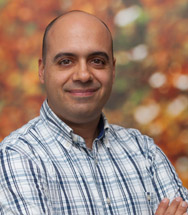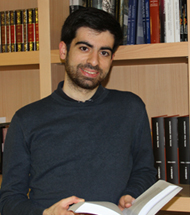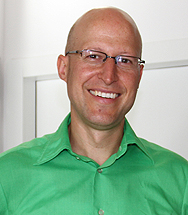Studying metaphor in 28 centuries of Greek poetry to better understand how imagination and creativity work.
Cristóbal Pagán, researcher of project 'Public discourse' of the ICS, has made a six-month stay at the University of Edinburgh (Scotland) thanks to a financial aid of the BBVA Foundation.

Cristóbal Pagán, researcher of the project 'Public discourse' of Institute for Culture and Society (ICS), has made a six-month stay at the Institute of Advanced programs of study in Humanities (IASH) of the University of Edinburgh (Scotland) thanks to a scholarship of the BBVA Foundation for Researchers, Innovators and Cultural Creators. Dr. Pagán was one of the 56 selected among the 1,664 applications received.
The research developed in Edinburgh is part of the project EMOCCC, the first diachronic study of the poetic expression of emotions in Greek poetry over 28 centuries.
During his stay, the philologist worked with Professor Douglas Cairns of project 'History of Distributed Cognition', which deals with the understanding of cognition from classical antiquity to the present day.
What does the research consist of that you have carried out during your stay?
The project consists of studying the semantic patterns and ways of expressing the emotion of love and the moment of falling in love in Greek literature. The particularity of this project is that, although it looks like a research of Greek literature or classical Philology , it is actually a project of linguistics and cognitive science. Examples from Greek literature are used to understand how metaphor works in general because it helps us to understand how concepts are combined and how imagination and creativity work. In this particular case, we use Greek poetry because it offers us 28 centuries of history in which we can draw various comparisons.
Greek poets of different periods often express love through a set of small spatial stories in which one thing comes out of another and goes into a different container. It is a group of cognitively very basic spatial stories, from which small scenes and metaphors are created in which something as complicated to explain or to express in words as a person feeling attraction for another, or falling in love, is structured as a spatial scene.
This is what happens with the arrows of love. A mythological being shoots one at you; the normal thing would be to bleed and go to the hospital, but the result is falling in love. These symbols, which when analyzed may seem absurd, work enormously well in poetry and also in everyday language because human beings are made to see the world in small scenes, preferably with a spatial component.
What activities have you developed during your stay?
During the project I have been in very good company. As host, I had the project 'History of distributed cognition' led by Douglas Cairns, Full Professor of Greek at the University of Edinburgh, and funded by the committee of research at Humanities of the UK (Arts and Humanities Research Council- AHRC).
This project studies the paradigm of distributed cognition, that is, how human beings think in a certain way because their perception, their body and their relationships with each other or with material things are a certain way, because they are made in a particular way. From mathematics to art, we think everything through the body, sensory perception, social Structures and the relationship with the environment we have.
The project discusses examples of intellectuals who have spoken out on this idea, even if they did not develop a structured scientific paradigm, and examples of how this phenomenon appears in the Arts and Humanities. It has a duration of four years and I have arrived during the first phase of its development, so I have been able to participate in three of the four seminars they have organized. In one of them I was speaker and I was able to present my work from research.
To what extent have you established contact with other prestigious researchers?
This project is, above all, a networking project . Numerous seminars have been organized in which more than 50 experts in distributed cognition have participated. Therefore, I have been able to establish relationships with people that I did not know or that I only knew through some of their work.
In addition, thanks to the project and the prestige of the scholarship of the BBVA Foundation, I have been admitted as a fellow at the high school of programs of study Advanced Humanities (IASH) at the University of Edinburgh. The IASH is a high school of programs of study advanced that invites researchers from Humanities and social sciences from all over the world. It has been a real privilege to work there on a day-to-day basis and to be able to participate in the center's activities. This has allowed me to enter contact with experts from many different disciplines.
The University of Edinburgh is the most important campus in Europe in the field of linguistics and very active in other disciplines related to the project, which has allowed me to meet researchers and participate in activities of Departments as the Classics or the School of Psychology.
Once in Spain, what is your assessment of your stay?
I am very happy because the UK is one of the countries where academic life is most dynamic and where there is the greatest demand from researchers to do a stay. At the same time, it is not a place where it is easy to get funding. The BBVA Foundation's scholarship has allowed me to do a stay for which it would not have been easy to obtain funding.
I have been able to debate not only with experts from cognitive linguistics, but also from other disciplines such as Psychology, Philology or History of Greek culture.
What differences do you find between the communities of your specialization program in Spain and the UK?
In the UK, the dynamism of universities is greater. The linguistics and cognitive science community, the programs of study on embodiment and all the paradigms that study how cognition works as a function of how the human body is made have more opportunities in the UK because there is more money going to research. This makes it possible to set up groups very easily and, at final, to do more things.
In Spain there is a very active linguistics and cognitive science community, but there is an inequality of resources and differences in the organizational structure of the universities grade .
What are your plans for the future?
In the immediate future, several articles will be published on project. Some have already been submitted and others are in preparation. I am also working on a monograph. In the medium term deadline, there is the ambition to publish all the data of the project, together with others from other projects, in the form of a database accessible through the Internet.
In the long term deadline, the relationships established with other researchers are very important because we will all continue to study these topics, and several of these researchers are leaders in their fields. In the future I would like, given the affinity of research with many researchers at the University of Edinburgh, to raise joint projects or initiatives with this university, which is one of the best partners you can have in the UK.



